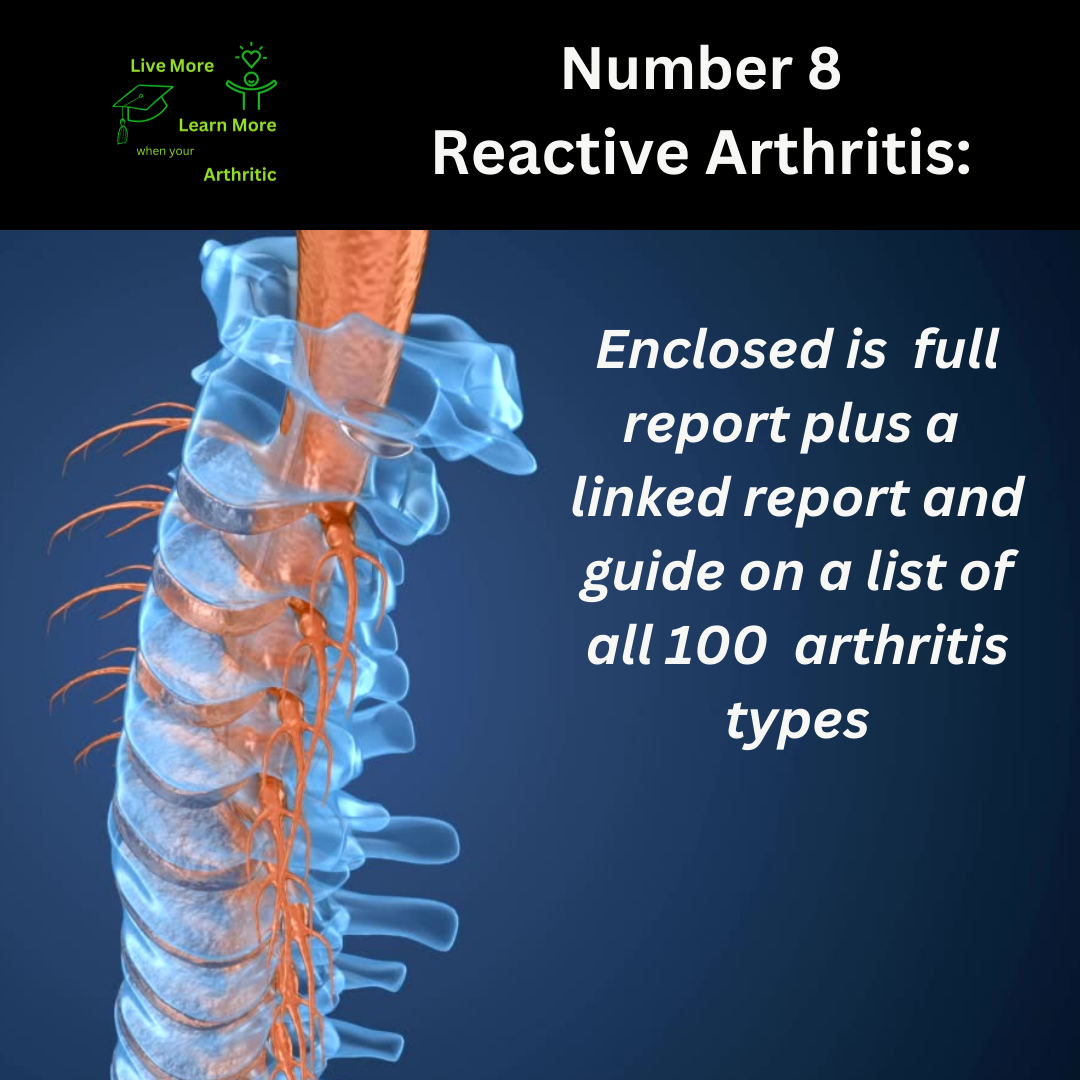
Reactive Arthritis: Number 8 on the list of 100 types of Arthritis
Reactive Arthritis: Understanding, Coping, and Thriving
In the world of arthritis, one form stands out for its unique characteristics and challenges: Reactive Arthritis. This condition, also known as Reiter’s syndrome, presents a complex interplay of symptoms and triggers that can significantly impact an individual’s life. Let’s delve into the depths of Reactive Arthritis, exploring its nuances, management strategies, and the potential for a fulfilling life despite its challenges.
 Description of Reactive Arthritis
Description of Reactive Arthritis
Reactive Arthritis is a type of inflammatory arthritis that develops in response to an infection in another part of the body, typically the urinary tract, intestines, or genitals. This condition is categorized by joint pain, swelling, and stiffness, often affecting the knees, ankles, and feet. Unlike other types of arthritis, Reactive Arthritis tends to develop following an infection and can cause inflammation not only in the joints but also in the eyes, skin, and urinary tract.
Causes and Triggers
The underlying cause of Reactive Arthritis is believed to be an overactive immune response triggered by certain infections, commonly those caused by bacteria such as Chlamydia trachomatis, Salmonella, Shigella, Yersinia, and Campylobacter. These infections can initiate an immune reaction in susceptible individuals, leading to inflammation and arthritis symptoms. Not everyone who gets these infections will develop Reactive Arthritis, indicating a complex interplay of genetic and environmental factors.
Symptoms and Impact on Mobility
Symptoms of Reactive Arthritis can vary but often include joint pain, swelling, stiffness, and limited range of motion. In some cases, individuals may experience inflammation of the eyes (conjunctivitis), skin (dermatitis), or urinary tract (urethritis). The joints affected by Reactive Arthritis can become stiff and difficult to move, impacting mobility and daily activities.
Age of Onset and Lifespan Impact
Reactive Arthritis commonly affects young adults, with the first onset typically occurring between the ages of 20 and 40. While it can significantly impair quality of life during active phases, Reactive Arthritis is not generally considered to shorten one’s lifespan. With proper management, including lifestyle adjustments and medical treatment, many individuals can achieve remission and maintain a good quality of life.
Autoimmune Nature of Reactive Arthritis
Reactive Arthritis is considered an autoimmune disease, wherein the immune system mistakenly attacks healthy cells and tissues in response to an infection. This autoimmune response leads to inflammation and joint damage characteristic of Reactive Arthritis.
Achieving a Higher Quality of Life
Despite its challenges, individuals with Reactive Arthritis can achieve a higher quality of life by adopting a proactive approach to management. This includes:
Lifestyle Modifications: Maintaining a healthy weight, avoiding smoking, and managing stress can help minimize flare-ups and improve overall well-being.
Possible Complications
Reactive Arthritis can lead to potential complications, such as chronic joint inflammation, joint damage, eye inflammation (uveitis), and skin conditions. Regular monitoring and prompt medical intervention can help mitigate these risks.
 Holistic and Natural Approaches
Holistic and Natural Approaches
While medical interventions play a crucial role, some individuals find relief from Reactive Arthritis symptoms through holistic and natural approaches, such as:
- Dietary Modifications: Anti-inflammatory diets rich in fruits, vegetables, and omega-3 fatty acids may help reduce inflammation.
- Herbal Supplements: Some herbs like turmeric and ginger have anti-inflammatory properties that may provide symptomatic relief.
- Mind-Body Practices: Techniques like yoga, meditation, and acupuncture can help manage pain and improve overall well-being.
Prevalence and Gender Distribution
Reactive Arthritis affects men more frequently than women, with a male-to-female ratio of approximately 3:1. The condition can occur at any age but is most commonly seen in young adults.
In conclusion, while Reactive Arthritis poses unique challenges, individuals diagnosed with this condition can lead fulfilling lives by adopting a proactive approach to management. Through a combination of medical treatment, lifestyle modifications, and holistic strategies, many individuals with Reactive Arthritis can achieve remission, minimize complications, and enjoy an improved quality of life. Early diagnosis and comprehensive care are key to effectively managing this condition and optimizing long-term outcomes.